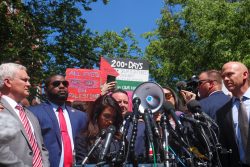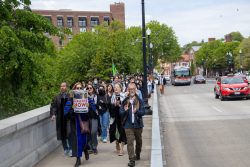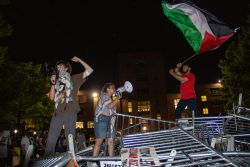Advisory Neighborhood Commissioner Justin Wagner (CAS ‘03) petitioned the D.C. City Council last Thursday to implement the Omnibus Public Safety Agency Reform Amendment, which is intended to strengthen relationships between the Metropolitan Police Department and area campus public safety agencies.
Specifically, Wagner and the Advisory Neighborhood Commission 2E, which includes Georgetown and Burleith, support amending current legislation to improve cooperation and coordination between MPD and the University’s Department of Public Safety.
“It is imperative that we establish a framework for improved cooperation and coordination between the Police Department and DPS,” Wagner said.
This legislation applies to all universities in the District of Columbia and serves as a framework for cooperation between the universities and MPD.
If passed, the amendment will allow MPD and DPS to share radio frequencies and equipment and also permit occasional patrols by campus security agencies throughout the three to five blocks immediately surrounding the University.
Wagner said that sharing radio frequencies and equipment is essential to a cooperative agreement between the two bodies and enhancing safety for university neighborhoods.
“Being able to communicate instantaneously is crucial for this type of cooperation,” he said.
Criminals do not respect city-imposed lines of jurisdiction, Wagner pointed out, and this legislation has the potential to greatly improve public safety in the community.
The second aspect of the amendment calls for extending the patrol area of campus police, especially at night.
Wagner said to the D.C. City Council that late-night patrols would deter criminals by providing a much needed police presence in the community. The number of students living off-campus is a strong argument for increased security, he said.
“Safety is always a concern for my roommates and me since we live off campus. Knowing there is smooth coordination between Metro police and DPS gives us some assurance that in an emergency, swift response can be counted upon,” off-campus student resident Elizabeth Cease (MSB ‘04) said.
According to Wagner, these cooperative agreements will improve safety not only for students but also for University neighbors.
“A shared concern of both students and longtime neighbors is public safety. This bill would be the first step to allowing increased safety patrols on the blocks surrounding the University,” he said.
The University said that it supports legislation proposal.
“It is essential that Georgetown University continue to work in partnership with the Metropolitan Police Department in order to protect the safety and security of students living on campus and in local neighborhoods,” Assistant Vice President for Communications Julie Green Bataille said.
The University’s only concern is that extending the role of DPS in the community will shift too many safety resources away from campus and the capacity of DPS to act effectively in public areas, Bataille said.
“We’re concerned about the safety of our officers and their ability to respond effectively to incidents without being equipped to do so,” she said.
According to the University, the administration will be working closely with area schools to develop an optimal method of cooperation.
Wagner said the legislation is expected to pass, but probably in an amended form.
“The bill itself has a number of reforms attached to it, from videotaping confessions to work requirements for officers. Because some of these issues are quite controversial, the bill is still working its way through committee,” Wagner said.
He emphasized, however, that almost every member of the D.C. City Council co-sponsors the legislation.




